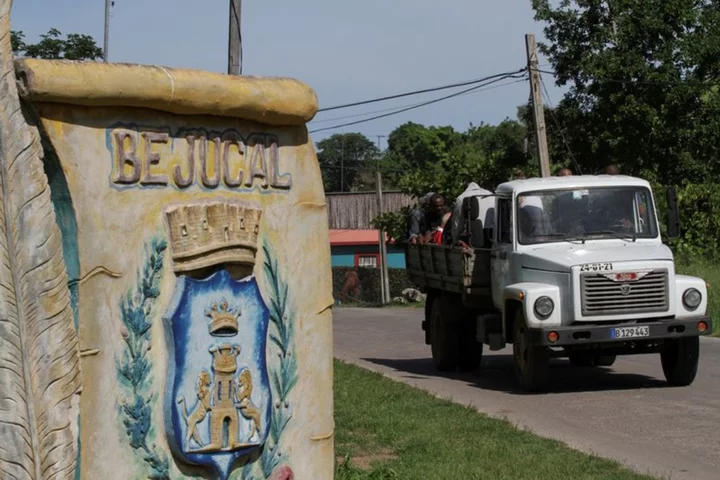By Dave Sherwood and Matt Spetalnick
BEJUCAL, Cuba Just outside the sleepy Cuban village of Bejucal, a winding track, rutted with potholes and losing ground to the jungle, ends at a barbed wire fence. A sign warns: "KEEP OUT, MILITARY ZONE."
What lies beyond remains largely a mystery, though the U.S. government has long suspected that China runs an intelligence gathering operation in this village that once hid Soviet nuclear warheads.
A Reuters reporter traveled to Bejucal this week, gaining rare access to the area around the site that remains an enigma, even for locals, but that has come under scrutiny after the Biden administration said Beijing may be using the island as a spying post.
The question of Chinese spying from Cuba was renewed last week following a Wall Street Journal report. The newspaper cited U.S. officials saying a new effort by China's security services was underway on the island. It comes at a time when U.S.-China relations have sunk to the lowest in decades.
Reuters saw large parabolic antennas high on a ridge above town, partially obscured by a hillside of royal palms. A rusted white metal dome, of the type that houses antennas, hovered over dark jungle, decorated on its flanks with cryptic black triangles, some inverted. Unidentified men on motorcycles, dressed in civilian clothes, photographed reporters as they worked.
The United States believes the little-known base, just 116 miles (187 km) from Key West, Florida is used to intercept U.S. electronic communications, according to a Federal Communications Commission (FCC) document from November 2022.
"(China's Communist Party) maintains physical presences at Soviet-era intelligence facilities at Bejucal in what appears to be a signals intelligence collection operation," the FCC document says, citing a 2018 report by the U.S.-ChinaEconomic and Security Review Commission.
Those concerns were, in part, noted as grounds to deny an application to connect Cuba to the United States through the ARCOS-1 undersea telecoms cable, according to the document, which was drafted by a commission that includes members of the U.S. Department of Homeland Security and Justice Department.
China, Washington’s top geopolitical rival, on Monday denied it was using Cuba as a spy base. Cuba did not reply to Reuters questions about the Bejucal installation.
But the communist-run government has dismissed prior allegations as a U.S. fabrication meant to justify Washington's decades-old economic embargo against the island.
Cuba says the only military incursion in its territory is the Guantanamo Bay Naval Base, which belongs to the United States.
The U.S. said on Monday that China had nonetheless upgraded its intelligence collection facilities in Cuba in 2019. The White House National Security Council did not respond to Reuters questions on whether Bejucal was the venue for those facilities, or whether it remained concerned about the site.
Around the base, in rolling countryside dotted with sugar cane and banana plants, many Cubans work small farm plots, traveling on bike or horseback.
Cuban farmer Arnaldo Perez, 61, has spent his life in Bejucal but told Reuters he had no idea who might be behind the sprawling, saucer-like green and white antennas tucked into a ridgeline above town.
"I know that has something to do with the military," said Perez, motioning toward the distant antennas as he rode his horse and carriage into town. "But I am a country person. I mind my own business."
'THERE ARE RUMORS'
The sleepy Cuban farm town has long been a place of secrets.
Just 20 miles (32 km) south of Havana, Bejucal gained notoriety after U.S. spy planes uncovered it as a hiding place for Soviet nuclear warheads during the 1962 Cuban Missile Crisis.
Moscow backed down and removed the missiles, but it is widely regarded as the moment when the U.S. and Soviet Union came closest to nuclear confrontation.
Bejucal reemerged from obscurity in 2016, when U.S. Senator Marco Rubio of Florida, a critic of the Cuban government, demanded Havana “kicks out this Chinese listening station in Bejucal” among a list of actions, including holding free elections, which he said he would require before reaching any deals with Cuba.
Fulton Armstrong, a former senior CIA analyst on Cuba, said little was known about Bejucal, but he downplayed the importance of the Caribbean island nation to China for spying on its northern neighbor.
“A listening post would be of marginal value (to China) in today’s technology,” he said, noting that Beijing now has access to more advanced spy equipment and techniques.
Armstrong acknowledged, however, the symbolic value of a Cuba-based operation for Beijing, as China has been deeply unhappy over U.S. spying in its neighborhood, including the Taiwan Strait and the South China Sea.
No one Reuters spoke with around the base had seen or heard reference to alleged Chinese involvement at Bejucal in recent years. Many, however, said they believed Russia had access to the base.
Deteriorating U.S.-Russia relations over Moscow’s invasion of Ukraine has fueled speculation that Russian President Vladimir Putin might decide to reopen a once-sprawling Soviet-era espionage base on the island at Lourdes, another relic of the Cold war that was closed in the early 2000s.
Onelvis Despaigne, 36, a farm worker who lives just outside the base, told Reuters on Monday he had not heard the recent foreign media reports on Chinese spying.
But if they were true, he said, he would soon find out.
"There are rumors," he said, grinning as he cleared his lawn with a machete. "Everybody knows everything here."
(Reporting by Dave Sherwood; Additional reporting by Matt Spetalnick in Washington, Editing by Adam Jourdan, Don Durfee and Bill Berkrot)

